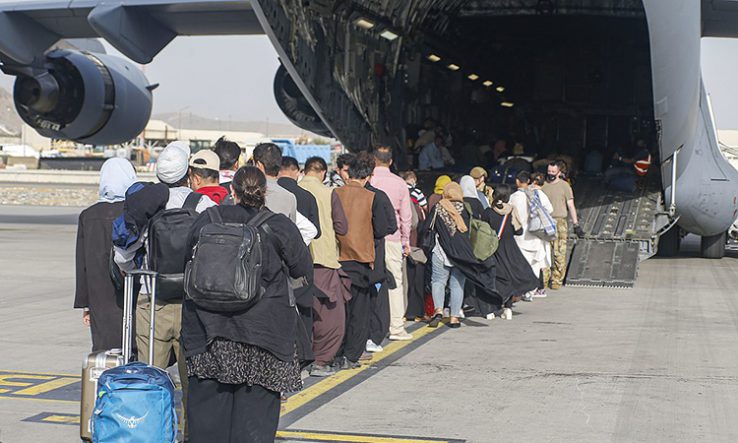
Chevening scholar hopes universities will open doors to those fleeing the Taliban
A Chevening scholar who escaped Afghanistan with his family has told Research Professional News he hopes UK institutions will help ensure that “dreams still remain” for those from his country who want to study at international universities.
There has been an outpouring of support from the academic community for Afghan researchers and students since the rapid fall of their government and the seizure of power by the Taliban over the summer. Universities around the world have offered to host refugee scholars and students, and politicians and research leaders have called for more to be done to help them.
Many fear violent reprisals if they stay, but it has become almost impossible for Afghans to leave their country after the last evacuation flights departed Kabul at the end of the chaotic withdrawal of US, UK and other Western nations’ troops (pictured).
Naimat Zafary, a University of Sussex student on the one-year, government-run Chevening programme, said students in Afghanistan need opportunities and routes to studying abroad. “I hope dreams still remain for [the young],” he said, adding that he hopes “the system is there” so learners can “make it to international universities”.
Zafary was speaking from a quarantine hotel in London following a dramatic ordeal as he tried to leave the country between 20 and 22 August. Many of his fellow citizens died in attacks on those making their way to evacuation flights. He said “tragic things” had happened, “which will remain in your memory, your mind, for a very long time”.
In August, the situation looked bleak for Chevening scholars as the Taliban advanced across Afghanistan. Zafary and the other 34 Afghans due to take up places at UK universities this September were told by the Foreign, Commonwealth and Development Office on 6 August that they would have to delay their places by a year, due to problems processing their visas.
But widespread outcry prompted the government to reverse its decision. A Home Office spokesperson said the UK has a “proud history of protecting people in life-threatening situations”, and the government is “determined to help as many Afghans as possible” through its resettlement scheme.
Afghans who have experienced life free of Taliban rule over the past 20 years have expressed terror at what the future holds. Previous Taliban rule was characterised by extreme versions of Islamic law, violent punishments, and a ban on education for women and girls.
But as the 31 August deadline imposed by US president Joe Biden for the withdrawal of all US troops approached, Afghanistan’s government and military rapidly collapsed, and by 15 August the Taliban had entered the capital, Kabul.
“In a few hours’ time, we lost everything we had—the system, the government, the president, everything,” says Zafary.
Escape from Kabul
After the Taliban seized Kabul, Zafary said he and the other Chevening scholars and their families were told to go to the Baron Hotel in Afghanistan’s capital, where they waited for a day before they made their way to the airport. Once there, they were told there was only room to take 25 people.
Zafary said the group split up and put forward those who had the greatest need to leave, including single women and families with small babies.
“We decided, OK, let’s go with the vulnerability option,” he said.
The rest of the group left the airport, but when they returned they discovered the gate they had been trying to use would not be accessible again for another few days. Instead, they tried to cross the crowds at Abbey Gate, an entrance to a different part of the airport.
Zafary estimates that around 15,000 people were packed tightly together at the gate, waiting for the chance to get inside.
“That way is almost 50 metres—not so long,” he said. “But it’s like, no one is moving. Everyone is standing like a brick.”
Eventually, the rest of the group made it through the crowds by creating a tight circle and refusing to break the chain as they moved. Once they moved through the dense queue, British soldiers took them through the airport. Around 10 hours later, at 6am, Zafary, his family and the rest of the group were on a plane heading towards the UK.
A few days after they reached London, on 26 August, a suicide bomber attacked the Abbey Gate entrance.
Zafary describes how he had spoken to families who had been waiting at the entrance for three or four nights for a chance to get on a plane.
“I cannot forget the faces of the people,” he said. “They may not be any more in this world, because they were just there.”
After finishing his stint in quarantine, Zafary is heading to the University of Sussex to study for a Masters’ degree in governance, development and public policy under the Chevening programme. He said he was driven to take the degree to gain skills to make his own country better, as “copy-and-paste” models of governance have been put in place that do not work for Afghanistan.
“I will use my knowledge…for the country in the future,” he said.
A version of this article also appeared in Research Fortnight